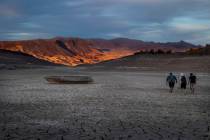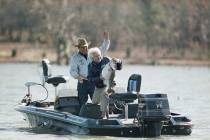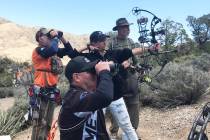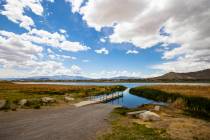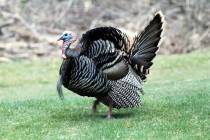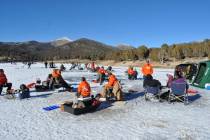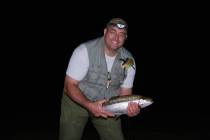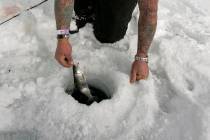Las Vegan reels in another award
In the fishing tackle industry, Las Vegas resident Ken Whiting is known as the "Wizard of Rods." His rod designs have dominated the competition in recent years, and during the 2007 International Convention of Allied Sportsfishing Trades (ICAST), Whiting won top honors in both the freshwater and saltwater categories, as well as the overall "Best of Show" award with fishing rods made from carrot fibers that were produced by e21 Fishing.
During ICAST 2008, held last week at the Las Vegas Convention Center, Whiting was on top again, but this time he won the clothing category with "Wind, Rain & Ice" extreme weather gear. This clothing maintains a constant internal temperature through what Nataliya Hearn of e21 Fishing described as a greenhouse effect. The insulation is made of 90 percent air and is called CarroTex.
Whiting's influence on the fishing industry could be seen in nearly every booth at the show that displayed a fishing rod. The next time you go to your favorite sporting goods store, look for rods without grips and you'll see what I mean.
Many products on display show little change from one year to the next, but I always manage to find a few things that are just a little different. This year, it seemed everyone wanted to establish their product as being "green." Two of the products that caught my green eye were methods of sinking your bait without using a lead weight. The first is the Stonze System, and the second is the Invisible Sinker.
As its name suggests, sort of, the Stonze System is designed for anglers who can't stand to spend time next to a body of water and not throw rocks. Actually, the Stonze System offers the anglers sinkers that are made out of real rocks, so they are eco-friendly and naturally camouflaged. One of the Stonze models is designed for use in a slip rig, and the other includes a ring that can be connected using a swivel or tied directly to a fishing line. If you lose one of your Stonze, it won't hurt the environment.
The Invisible Sinker is fashioned after the traditional egg sinker or one of those clear plastic bubbles, complete with a hole bored from one end to the other so your fishing line can pass through. But rather than being made of lead or plastic, the Invisible Sinker is made from lead crystal. If your line breaks, the sinker becomes an invisible rock on the bottom of the lake or stream. Don't worry about the Invisible Sinker breaking, I watched as co-inventor Steve Doss repeatedly dropped a 1-ounce sinker from a height of 6 feet onto a steel plate without it breaking.
The invisible sinker comes in one-quarter-, one-half-, 1- and 3-ounce sizes. Doss said the sinker won't spook fish because they can't see it.
Makers of fishing line and plastic baits also are joining the green team by combining the worlds of fishing and biomedical technology.
Wayne Black worked in the medical field and was involved with implants. Using that technology as a base, Black invented Bioline, a new fishing line he calls biofilament. Bioline is made from 100 percent biodegradable polymer that should last 10 to 12 months on the reel, Black said. As long as the extra line is kept in the specially designed packaging, it should stay fresh until it is used. Bioline comes in 4-, 6-, 8-, 10- and 12-pound test.
By combining traditional plastic bait designs with a biometric membrane, the folks at Lake Resource Group created a collection of soft plastic baits called IronClads. The mesh makes the bait virtually indestructible and protects the bait so neither fisherman nor fish can rip a hook from the bait.
I tried to rip a hook from various soft plastic baits and couldn't do it. Professional angler Charlie Thibodeaux told me he has been using the same finesse bait for two months despite catching several largemouth bass. No bait loss means no environmental impacts.
• BOATERS EXEMPT PERMIT -- Recreational boaters can breathe a sigh of relief because Congress, in a rare display of common sense, voted to scrap the discharge permit requirement created through a ruling by the U.S. District Court of Northern California. That ruling directed the federal Environmental Protection Agency to establish a permitting system that would require recreational boaters to obtain a permit from the EPA before they could discharge any water that finds its way into their boat back into the body of water it came from.
Crafted by Florida Sen. Bill Nelson, the Clean Boating Act of 2008 specifically exempts recreational boaters from environmental rules originally passed by Congress to limit the discharge of water by oceangoing vessels. A recreational boat is defined in the act as "any vessel that is manufactured or used primarily for pleasure; or leased, rented or chartered to a person for the pleasure of that person."
Had the bill not passed, boaters could have faced inspections and fines as high as $32,500 per day for allowing deck water or incidental spills to flow overboard.
Doug Nielsen is an award-winning freelance writer and a conservation educator for the Nevada Department of Wildlife. His "In the Outdoors" column is published Thursday. He can be reached at doug@takinitoutside.com.








